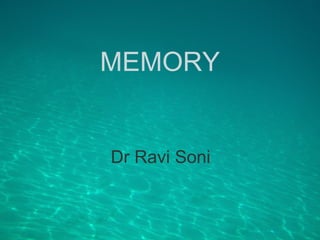
Memory theories
- 2. MEMORY • Cognition: is the processing of the information coming from the environment through our senses. • Information: refers simply to sensory input from the environment
- 3. MEMORY • Memory: is complex cognitive or mental process that involves encoding, storage and retrieval of the information. I. Encoding: is process of receiving input and transforming it into a form or code, which can be stored. II.Storage: is process of actually putting coded information into memory. III.Retrieval: is process of gaining access to stored, coded information when it is needed.
- 4. MEMORY • Theories of memory formation: 1.Information-Processing theory 1.Level of processing theory
- 5. Information-Processing Theory • Like digital computer • Developed by Richard Atkinson and Richard Shiffrin (1968) • Environment sensory input Sensory register Short term memory (STM) Retrieval Categorization Long term memory Rehearsal (LTM) • Example: Remembering telephone number
- 6. Sensory Register • Storage function sensory channels (visual, auditory, olfactory, tactile, gustatory) is called sensory register. • Information is held for very brief period • Most of it is usually lost • Information which was attended and recognized, passed to STM • Visual sensory register holds information for 1 second in the form of ICONIC IMAGE which is a copy of visual input stored as faint image • Auditory sensory register holds information for 4 to 5 seconds.
- 7. Short Term Memory • The memory which holds information received from the sensory register for upto 30 seconds, length of time depends on number of factors. • Experiment: technique used in this experiment is called ‘FREE RECALL’. The subjects were shown 15 nouns. Each presented for 1 sec. and 2 seconds interval in between, subjects were asked to recall the nouns in any order that came to mind • Zero delay condition: 1. Serial position effect 2. Primacy effect 3. Recency effect • 10 or 30 seconds delay: If delay interval is filled with mental activity, decrease or elimination of recency effect but not primacy effect was found
- 8. Short Term Memory • Cause: last item in the list is still in STM • STM: Transient quality Limited storage capacity-7 items, plus or minus 2 • Storage capacity can be increased by process called CHUNKING- dividing total information into chunks and then remembering them • Example: remembering telephone numbers • Fate of information in STM: information is mostly lost by newer information which displaces the old one. • Some of the information in the STM is neither lost nor retrieved but passed along the next memory stage (long term memory) through REHEARSAL.
- 9. Rehearsal • Process of rehearsal consists of keeping items of information in the centre of attention, perhaps by repeating items silently or aloud. • More the item is rehearsed more likely it is to be transformed into long term memory. • Depends upon: Amount of rehearsal Ways of rehearsal
- 10. Rehearsal Maintenance rehearsal o Passive process of repetition o Going over and over again, what is to be remembered Elaborative rehearsal o During rehearsal material is given organization and meaning so that it can be fitted into existing organized long term memories
- 11. Long Term Memory • The memory which holds information received from STM for long period of time. (precise time not known) • May be days, months, years or life time • Storage capacity-no limit • FORGETTING OF LTM: information is there, we have difficulty in retrieving it because • It is not stored in an organized fashion or we are not searching it in right path of memory storehouse • Of confusion & interference produced by new things which have been learned and put into LTM
- 12. Long Term Memory • LTM: contains words, sentences, ideas, concepts and the life experiences, we have had • SEMANTIC MEMORY: contains meanings of words & concepts and the rule of using them into the language, it is a vast network of meaningfully organized items of information • EPISODIC MEMORY: containing memories of things that have happened to a person in the past.
- 13. Level of Processing Theory • According to this theory, incoming information can be worked on at different levels of analysis, the deeper the analysis goes, the better the memory. • Perception: gives us immediate awareness of the environment • Structure: features of input (what it looks like, or sounds like) are analyzed • Meaning: meaning of the input is analyzed • Analysis to the deep level of meaning gives the best memory • Routine happenings of daily life are not processed deeply
- 14. Level of Processing Theory • Rehearsal plays a role in the deeper processing of the information. • Maintenance rehearsal is not enough for good memory • Elaborative rehearsal processes information to the meaning level, so that memory is well retained • Greater elaboration greater possibility that memory is remembered
